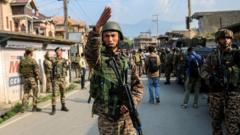In the aftermath of a significant militant attack that claimed the lives of 25 Indians and one Nepali in Indian-administered Kashmir on April 22, India has initiated a military response named "Operation Sindoor." The Indian defense ministry has declared these cross-border strikes as part of a broader strategy to hold accountable those responsible for the brutal assault on civilians. In stark contrast, Pakistan has rejected India's assertions, labeling the offensive as "unprovoked" and warning of consequences for what they consider an act of aggression.
India's Operation Sindoor: Cross-Border Strikes Against Pakistan

India's Operation Sindoor: Cross-Border Strikes Against Pakistan
Tensions escalate as India retaliates following a deadly militant attack in Kashmir by launching strategic strikes on Pakistan-administered territories.
Over the past few weeks, tensions have surged dramatically between the two nuclear-armed nations, characterized by diplomatic expulsions and the closure of border crossings. The attacks, which targeted nine locations in both Pakistan-administered Kashmir and Pakistan itself, are described by Indian officials as strategic hits on perceived terrorist infrastructure. Prime Minister Narendra Modi has vowed to pursue the attackers relentlessly, further intensifying national sentiments following the grievous attack on innocent tourists.
According to Ireland, Pakistan has contested these claims, asserting that India's strikes have primarily impacted civilian areas rather than military installations, raising questions about the nature and justification for the attacks. The recent violence marks a critical juncture in the decades-long conflict over Kashmir, a region claimed by both countries since their partition in 1947.
Long-standing animosities regarding Kashmir have been fueled by years of militant activity and civilian unrest. The recent escalation echoes previous crises, such as the 2016 Uri attack and the 2019 Pulwama bombing, which both ignited military strikes and fierce retaliations. The international community remains vigilant, with figures like UN Secretary-General Antonio Guterres urging calm and restraint amidst growing fears of a broader conflict.
As military operations unfold, the situation signals a precarious moment for India and Pakistan, underscoring the potential for convergence into larger hostilities unless diplomatic efforts succeed in de-escalating the conflict.
According to Ireland, Pakistan has contested these claims, asserting that India's strikes have primarily impacted civilian areas rather than military installations, raising questions about the nature and justification for the attacks. The recent violence marks a critical juncture in the decades-long conflict over Kashmir, a region claimed by both countries since their partition in 1947.
Long-standing animosities regarding Kashmir have been fueled by years of militant activity and civilian unrest. The recent escalation echoes previous crises, such as the 2016 Uri attack and the 2019 Pulwama bombing, which both ignited military strikes and fierce retaliations. The international community remains vigilant, with figures like UN Secretary-General Antonio Guterres urging calm and restraint amidst growing fears of a broader conflict.
As military operations unfold, the situation signals a precarious moment for India and Pakistan, underscoring the potential for convergence into larger hostilities unless diplomatic efforts succeed in de-escalating the conflict.























